When asked what he does for a living, Maurice Middleberg answers with a smile: “I free slaves.” Last week, he told students just how he does it, as a guest lecturer at the University of Denver’s Josef Korbel School of International Studies’ Human Trafficking Center.
Long after the Emancipation Proclamation and an array of domestic and international laws criminalizing exploitive labor practices, an estimated 21 million people remain in slavery around the world, minus the over 10,000 Free the Slaves has liberated since 2000.
Middleberg described three main approaches to fighting human trafficking:
- Groups like Verite seek to fight trafficking by exposing labor exploitation in corporate supply chains.
- Others, like International Justice Mission, focus their efforts on increasing criminal prosecutions to change the cost-benefit analysis to traffickers who benefit from this “low-risk, high profit” crime.
- Free the Slaves focuses on community-building strategies. Even while freeing individual enslaved people, Middleberg noted that vulnerabilities to trafficking tend to be community-wide, and solutions for sustainable liberation must be rooted in communities.
With that in mind, Free the Slaves seeks to step-up its efforts by expanding the number of countries and communities it serves, strengthening the capacity of more local institutions, and building coalitions within and across borders.
With a staff of only around 25 people worldwide, this may seem like a daunting task, but Middleberg explained Free the Slaves partners with many local activists, and takes a long-term vision of capacity building that makes sure people who are freed have productive places in communities to which they can return.
The Human Trafficking Center is committed to using academic rigor and transparency, sound methodology, and reliable data to understand forced labor and human trafficking, so students took particular interest in Middleberg’s discussion of how Free the Slaves monitors and evaluates its projects. Having done the difficult and resource-intensive studies necessary to determine the prevalence of human trafficking at the individual level in the Democratic Republic of the Congo, Free the Slaves has since shifted its focus to the community level. Middlberg described 16 standard indicators that measure things like institutional capacity and the efficacy of the local criminal justice system that can be improved to eradicate trafficking.
This exciting work should be a welcome complement to other approaches, and the results thus far show promise as the work of Free the Slaves scales up to bring increased action and not just awareness.
Rex Hamaker is the marketing and communications director at the University of Denver’s Human Trafficking Center.

